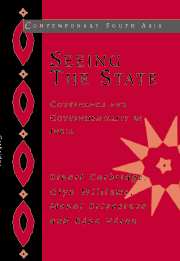Book contents
- Frontmatter
- Contents
- List of boxes, figures and tables
- Acknowledgements
- Glossary
- List of abbreviations
- Introduction
- Part I The state and the poor
- Part II The everyday state and society
- Part III The poor and the state
- Appendix 1 Major national programmes and policies related to poverty alleviation, 1999
- Appendix 2 The 1999 general election in Hajipur
- References
- Index
Appendix 2 - The 1999 general election in Hajipur
Published online by Cambridge University Press: 22 September 2009
- Frontmatter
- Contents
- List of boxes, figures and tables
- Acknowledgements
- Glossary
- List of abbreviations
- Introduction
- Part I The state and the poor
- Part II The everyday state and society
- Part III The poor and the state
- Appendix 1 Major national programmes and policies related to poverty alleviation, 1999
- Appendix 2 The 1999 general election in Hajipur
- References
- Index
Summary
What follows is a report on the 1999 parliamentary election in Hajipur, Vaishali, that was written for the research team by our co-worker, Vishwaranjan Raju. Many of the themes that Vishwaranjan teases out here (gender issues, the relationship of local and national political figures, the temporary ‘stopping’ of the development state) are not specific to Hajipur. Several of them can be observed in elections in West Bengal, for example. Nor should we assume that the everyday qualities of political life in a District are captured in extremis by the events that occur at election time. This report should rather be read as a complementary piece to the accounts of political society in Vaishali that we built up in part II of the book.
For the record, the parliamentary seat of Hajipur was won in 1999 by Ram Vilas Paswan for the Janata Dal (United). The Janata Dal (United) was part of the BJP-led National Democratic Alliance which swept to power in New Delhi. Ram Vilas Paswan had won the seat in 1998 for the Janata Dal. At this point he was an ally of Laloo Yadav. The runner-up in the 1999 elections was Ramai Ram for the Rashtriya Janata Dal. Ramai Ram would have been required to resign his position as an MLA and State Minister in the government of Bihar had he won the parliamentary seat of Hajipur. Ram Sunder Das was placed third (in 1998 he took second place for the Samajwadi Janata Party (Rashtriya)).
- Type
- Chapter
- Information
- Seeing the StateGovernance and Governmentality in India, pp. 283 - 291Publisher: Cambridge University PressPrint publication year: 2005



